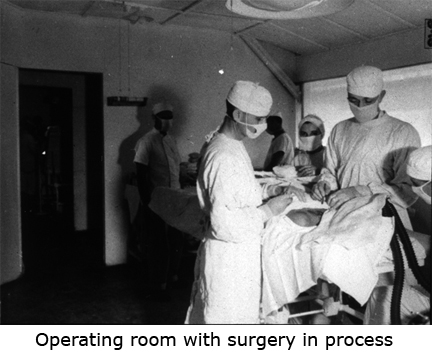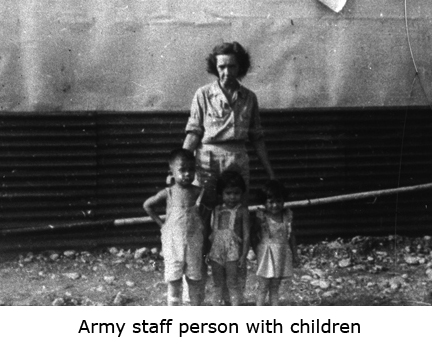In the Forward to the Quarterly History, Volume 1, Lt. Colonel George L. Beatty writes: “It is our hope that this history may be of some interest, and possibly of some small value to other medical installations in the future.” Beatty’s hope was unfulfilled from 1945 until today, when Falk Library staff have provided detailed information about Beatty’s works and mounted selections on the Web.
 The collection is from the 27th General Hospital in New Guinea for which Beatty was the commanding officer from August 1944 to July 1945. Contained in the collection are two bound volumes of reports, articles, illustrations, charts, graphs, and photographs along with 33 glass plate slides. Volume one contains three quarterly reports that describe the activities in the hospital, including detailed medical reports that discuss types and numbers of operations, numbers of patients, incidence of wounds and mortality percentages from them, and detailed discussions of treatment for non-surgical patients. Dental and psychiatric services are included. The volume is illustrated with photographs (from the glass slides) and hand-drawn sketches. Volume 2 includes surgical reports, papers written by staff doctors on various medical procedures or treatments, and 28 detailed autopsy reports (with patients identified by name).
The collection is from the 27th General Hospital in New Guinea for which Beatty was the commanding officer from August 1944 to July 1945. Contained in the collection are two bound volumes of reports, articles, illustrations, charts, graphs, and photographs along with 33 glass plate slides. Volume one contains three quarterly reports that describe the activities in the hospital, including detailed medical reports that discuss types and numbers of operations, numbers of patients, incidence of wounds and mortality percentages from them, and detailed discussions of treatment for non-surgical patients. Dental and psychiatric services are included. The volume is illustrated with photographs (from the glass slides) and hand-drawn sketches. Volume 2 includes surgical reports, papers written by staff doctors on various medical procedures or treatments, and 28 detailed autopsy reports (with patients identified by name).
 Of special interest to medical historians may be the articles written by staff doctors, a few of which were also published in medical journals. One unpublished article is “Anesthetic Procedures used in a General Hospital in the Communication Zone with Analysis of 2,000 Anesthetics” by Captain Leonard M. Monheim of the Dental Corps. In another article, written by Captain Thomas N. Meredith, “Penicillin Therapy at the 27th General Hospital,” the author stated: “No fundamentally new concepts were discovered, but penicillin was used widely for a great variety of conditions, and considerable experience as to its possibilities in topical and local administration was gained.” This unknown article gives further evidence of the vital role played by penicillin in World War II as it became widely used.
Of special interest to medical historians may be the articles written by staff doctors, a few of which were also published in medical journals. One unpublished article is “Anesthetic Procedures used in a General Hospital in the Communication Zone with Analysis of 2,000 Anesthetics” by Captain Leonard M. Monheim of the Dental Corps. In another article, written by Captain Thomas N. Meredith, “Penicillin Therapy at the 27th General Hospital,” the author stated: “No fundamentally new concepts were discovered, but penicillin was used widely for a great variety of conditions, and considerable experience as to its possibilities in topical and local administration was gained.” This unknown article gives further evidence of the vital role played by penicillin in World War II as it became widely used.
Library staff does not know how this collection came to Falk Library. However, Lt. Colonel James R. Watson was Chief of Surgical Service at the Hospital, and he, Captain Monheim, and Captain John J. McAleese were affiliated with the University of Pittsburgh.
An online exhibit of the collection is available. Further information about the collection can be found in the finding aid. The bound volumes can be viewed in the Rare Book Room by appointment.
~ Leslie Czechowski